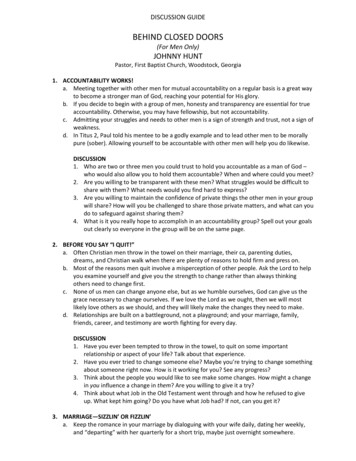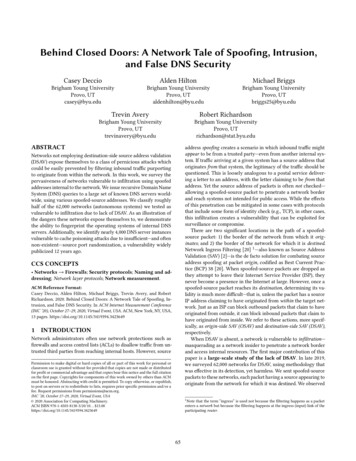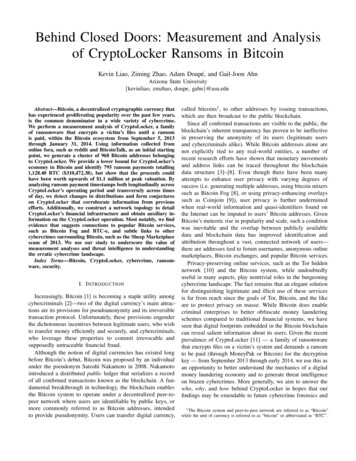
Transcription
DISCUSSION GUIDEBEHIND CLOSED DOORS(For Men Only)JOHNNY HUNTPastor, First Baptist Church, Woodstock, Georgia1. ACCOUNTABILITY WORKS!a. Meeting together with other men for mutual accountability on a regular basis is a great wayto become a stronger man of God, reaching your potential for His glory.b. If you decide to begin with a group of men, honesty and transparency are essential for trueaccountability. Otherwise, you may have fellowship, but not accountability.c. Admitting your struggles and needs to other men is a sign of strength and trust, not a sign ofweakness.d. In Titus 2, Paul told his mentee to be a godly example and to lead other men to be morallypure (sober). Allowing yourself to be accountable with other men will help you do likewise.DISCUSSION1. Who are two or three men you could trust to hold you accountable as a man of God –who would also allow you to hold them accountable? When and where could you meet?2. Are you willing to be transparent with these men? What struggles would be difficult toshare with them? What needs would you find hard to express?3. Are you willing to maintain the confidence of private things the other men in your groupwill share? How will you be challenged to share those private matters, and what can youdo to safeguard against sharing them?4. What is it you really hope to accomplish in an accountability group? Spell out your goalsout clearly so everyone in the group will be on the same page.2. BEFORE YOU SAY “I QUIT!”a. Often Christian men throw in the towel on their marriage, their ca, parenting duties,dreams, and Christian walk when there are plenty of reasons to hold firm and press on.b. Most of the reasons men quit involve a misperception of other people. Ask the Lord to helpyou examine yourself and give you the strength to change rather than always thinkingothers need to change first.c. None of us men can change anyone else, but as we humble ourselves, God can give us thegrace necessary to change ourselves. If we love the Lord as we ought, then we will mostlikely love others as we should, and they will likely make the changes they need to make.d. Relationships are built on a battleground, not a playground; and your marriage, family,friends, career, and testimony are worth fighting for every day.DISCUSSION1. Have you ever been tempted to throw in the towel, to quit on some importantrelationship or aspect of your life? Talk about that experience.2. Have you ever tried to change someone else? Maybe you’re trying to change somethingabout someone right now. How is it working for you? See any progress?3. Think about the people you would like to see make some changes. How might a changein you influence a change in them? Are you willing to give it a try?4. Think about what Job in the Old Testament went through and how he refused to giveup. What kept him going? Do you have what Job had? If not, can you get it?3. MARRIAGE—SIZZLIN’ OR FIZZLIN’a. Keep the romance in your marriage by dialoguing with your wife daily, dating her weekly,and “departing” with her quarterly for a short trip, maybe just overnight somewhere.
b. There may be limitations in your finances and schedules, so be creative and remember thatthe way you spell “love” in a relationship is T-I-M-E!c. If you want your wife to hear you, make sure you learn to hear her first; and don’t just listento the words – make sure you hear her “heart.”d. Don’t assume that your wife’s needs are the same as yours; in fact, they are probably verydifferent. Security is usually a woman’s greatest need, but well down the list for men.e. Men are pretty good at doing what they like to do, like watching TV, sports, building things,etc., but many men don’t even know what their wives like to do. Find out what your wifereally enjoys doing and do it with her even if it seems like a sacrifice to you.DISCUSSION1. When was the last time you dated your wife or took her away for the weekend?2. How much time do you devote each week exclusively to your wife? How does thatcompare to the time you spend watching TV or enjoying your hobbies?3. When you talk to your wife, do you really listen or do you do what most men do – startthinking of a response before she finishes talking? How can you become a betterlistener?4. Do you know what your wife’s greatest needs are? How can you reassure her that herneeds are serious priorities to you?5. What does your wife really enjoy doing? When was the last time you did that with her?Maybe she needs some encouragement. How will it benefit your marriage if youencourage her?4. THE SEDUCTIVE LURE OF THE SECOND LOOKa. Sin will take you further than you want to go, cost you more than you want to pay, and keepyou longer than you want to stay.b. Like Job, you can make a covenant with your eyes to reject that seductive second look (seeJob 31:1), so make that covenant and keep it every day.c. Consider the danger of that second look because the potential cost is your home, yourcareer, your reputation, friends, finances, your future, and your fellowship with God.d. The Devil is in no hurry to bring you down through moral failure. Like a patient fisherman,he will keep the bait out there until just the right time when you are ripe for a fall. Keepyour guard up at all times (Proverbs 4:23).e. Satan is in the reduction business – he wants to bring you down. Jesus is in the additionbusiness – he always lifts you up (John 10:10).f. Keep this encouraging thought in your mind: God always gives you the strength to do whatHe asks you to do, and in this case, that means rejecting that second look.DISCUSSION1. Do you notice when an attractive woman enters your field of view? Do you look at her,and if so, how long? How long is too long, and what can you do to train your mind tolook away and not go back for that second look?2. Who would be affected if that second look eventually resulted in a major moral failure?How would each person would be affected?3. Financial problems in your marriage might make you more susceptible to the seductivelure of the second look. What are some other problems that might make you just asvulnerable? Discuss ways to overcome this vulnerability.4. The Devil knows there are particular places where he can tempt you, and there might bespecific people already giving you that seductive second look. Where are those placesand who are those people? Share this with an accountability partner and ask him to helpyou resist these temptations.2
5. MIND-OVER-SEX MATTERSa. The strongest sex organ a man has is his mind – his brain – and the Bible treats the mind andthe heart as one (Proverbs 4:23).b. Moral failures do not result from blowouts but from slow leaks, the result of not guardingwhat goes in and out of our minds.c. Philippians 4:7-8 promises the power of the Holy Spirit to help guard our hearts and mindsby encouraging us to think on positive things.d. Wrong thinking can lead us to believe there is something wrong with other people (such asour wives, children, coworkers, etc.) when the real problem is with us.e. We men must recognize that every day we are in a spiritual battle of the mind againstpowers much stronger than we are. These powers will suggest to our minds thoughts thatare against the will of God, but the Holy Spirit can empower us to bring those thoughtsunder Christ’s control (2 Corinthians 10:3-5).f. Be careful what you take into your mind, especially through your eyes, because it willinfluence the life you live. Immoral actions are always bred in the mind before they arecarried out. They can become habits and then strongholds which are difficult to destroy.DISCUSSION1. What do you think about this claim that the mind (brain) is a man’s strongest sex organ?How is your mind involved in your sex life?2. Do you know of someone who has fallen morally, and it seemed like a suddenoccurrence until you later discovered that it had been a drawn-out situation? If moralfailure is a process rather than an event, what are the stages of it?3. How can you guard your mind against sexual immorality? Read Romans 12:1-2 anddiscuss what you find there.4. How can you use your mind to enjoy a better sex life with your wife? After all, your mindis your strongest sex organ.6. WHAT YOUR KIDS WANT YOU TO KNOW (THAT THEY’LL PROBABLY NEVER TELL YOU)a. No matter how smooth or rocky your relationship might be with your kids, you are still theirdad, and you have the potential to be a real hero to them if you do certain things right.b. Your children really want your help with life issues as long as it comes in a comforting way.Guide them through problems instead of just quickly laying down the law and telling themwhat to do; be patient with them as they grow into adulthood at their own pace.c. Most children struggle to keep up because of peer pressure, school work, and other factors,so they need to know that everyone struggles – even you. It’s just a normal part of life. Prayfor them and with them.d. Your children need your undivided time and attention. Show them they come first beforeTV, newspaper, hobbies, etc. They want to see big ears instead of a big mouth! Allow themto talk without interrupting them and overpowering them with your own opinions.e. Your children need to see that you love their mother. Be affectionate with your wife in frontof them.f. Your children want your approval – not your criticism. Don’t put them down, talk down tothem, insult them or embarrass them, especially in front of peers or other family members.You may think you’ve “won” – but you’ve really “lost.” Everybody will pay a price.g. Your children need to see a life of integrity; so model the life you are telling them to live.Live out Matthew 6:33. Keep Jesus first and teach your kids to do the same. You will have abetter chance of seeing them become the children you want them to be.h. It’s no secret: Kids today need money. It costs money to be a kid these days! And kids don’twant to have to ask for money every time they need it. Stay in touch with their needs. Don’tmake them beg and don’t put them on a guilt trip for needing extra money for something.3
DISCUSSION1. Do you enjoy free and open communication with your children? Is your discussion withthem superficial or do you talk with them about the important details of their lives?What are their struggles, their highs and lows?2. Do your children come to you when they need help or do they prefer to go somewhereelse? If it is the latter, why do you think this is so, and what can you do to change it?3. Men often tell kids to do or not to do certain things and then turn right around and dothose same things themselves. Are there any bad habits or attitudes in your life thatneed to be corrected? Talk with your group and pray for each other about this.4. Talk about your “kids and money.” How generous are you with them? Should you bemore generous? There needs to be a correlation between their being respectful,responsible and resourceful – and your generosity. Are your kids learning generosityfrom you?7. TAKE TIME TO SMELL THE ROSESa. We men by nature move from one task to another, rarely stopping to smell the roses. Wehave to learn to slow down long enough to rest, refresh and enjoy the simple things in life.b. Begin this process by admitting that you are not Superman and that you have a need fortimes of refreshing. Be sure to establish margins that allow free time in your schedule.c. Make sure you know who and what is important to you. Find out what encourages you, thenprioritize those things. Minimize the things that discourage you.d. Develop the disciplines of reading, prolonged times of prayer, and long talks and walks withthe people you love most.DISCUSSION1. What does genuine “rest” look like? What does it feel like? When was the last time youfelt completely refreshed and renewed?2. Examine your schedule. Do you move from one task to another, rarely taking time forcomplete refreshing? How can you adjust your schedule to ensure the rest you need forthe long haul?3. Who are the people who are really important to you? Are they getting your time andattention? Are there any unimportant items on your calendar that need to go so you canrest and focus on the things that matter? Let someone look at your schedule with you tosee what is missing and what could be omitted.4. Which of the disciplines listed above do you already have? If needed, which one will youwork on first? Commit to Lord and to your accountability partners that you will do this.8. YOUR KID’S IN TROUBLE—WHAT DO YOU DO?a. Depending on the nature of the trouble, take time to think before you act. Don’t just fly offand act irresponsibly based on exploding emotions. Be in control of your senses andreasoning power.b. Be sure you get all the facts; pray for wisdom and a cool head (a soft answer turns awaywrath, Proverbs 15:1). Confer with your wife or trusted friends as to how to respond.c. Don’t overreact or assume that your child is solely responsible. Think about the example youhave been setting – you may play a role in the situation.d. Explore what greater issue or problem might be present; the situation might turn out to be ablessing in disguise because you may discover something that would have otherwise goneunknown until the situation became even more serious.e. Don’t be condemning or accusatory. Don’t add insult to injury. Your child will more likelyopen up, share the deeper issues and accept your authority if you remain calm.f. Focus on discipline (teaching and learning) rather than punishment (unpleasantconsequences for unacceptable behavior). You want your child to make positivechanges – not walk around thinking about the “scars” you inflicted on him or you’re yourgoal is restoration – not alienation.4
g. Confer with others who have wisdom or may have experienced the same problems. Youdon’t have to walk this journey alone. Even adults have to learn and grow.DISCUSSION1. How do children get in trouble today and how does it differ from the kind of trouble kidsgot into when you were younger?2. Think about crisis experiences in your past as a child or today as an adult. What did youlearn from those experiences? What factors helped or hindered resolution of thesituation?3. Reverse the crisis situation in your mind and discuss the following questions. What is thechild thinking about their parents? What is the parent thinking about their child? Whatare the benefits of trying to see a situation from the other’s perspective?4. Talk about the difference between discipline and punishment. Read Hebrews 12:5-11and discuss how God disciplines His children. What can parents learn from this?9. WHO’S THAT MAN IN THE MIRRORa. We’d better take time to look in the mirror because no one can really see what lies beneaththe surface as well as we can?b. It is important for every man to take care of himself for the sake of his spouse, his children,and other people he influences. Remember, you are the most important person in the worldto someone, maybe to several people.c. Take good care of your spiritual, mental, emotional, and physical health by controlling whatgoes into your mind and body.d. Developing personal disciplines such as reading the Bible and devotional materials, readingthat challenges you to live a balanced life, being with other godly men, exercising regularlyand eating properly are important to being your best for God and others.DISCUSSION1. When was the last time you took a good long look at the man in the mirror? What didyou see? Discuss some areas that may need attention.2. How does taking care of yourself enhance your relationship with God and others? Bespecific with your answers.3. Of these life areas – spiritual, mental, emotional, and physical – which one is thestrongest in your life? Which one do you need to work on most? Make a plan forworking on the weakest one and share it with your accountability partners.10. THE LEGACY YOU WANT TO LEAVEa. Looking at the lives of men in the past and the present, one thing is clear to us – we will allbe remembered by how we finish.b. Ask God to help you finish strong, living faithfully all the way to the end. Be specific withwhat are you asking God to give you in the way of your legacy.c. Take time to write down your life’s highest priorities and list them in order. Ask your spouseor other confidants to help you determine if you are living by those priorities.d. Write out your obituary according to how you would like it to read and meditate on what itwill take to make it read like that.e. Hebrews 4:11 talks about Abel’s legacy and teaches us that we can invest our life so we cancontinue to influence others even after we are gone.f. Whatever your legacy may be, make sure it is more about others than about yourself.DISCUSSION1. Discuss what it means to finish strong. In what areas of life should we try to finish strong– marriage, family, work, Christian service? What other areas would you include?5
2. What are some attributes you want to be remembered for after you’re gone? Will thathappen as things are now going? If not, what specific steps do you need to take to makesure those attributes become a reality in your life?3. Have you made that list of your life’s priorities yet? Do it now and follow theinstructions above to make sure they are realistic. Then go to work on them!4. What influence will your life have on others when you are gone? Will your life influencefuture generations? How so? What are some things you’d like to accomplish before yourlife is over?11. KEYS FOR ENCOURAGING YOUR FAMILYa. Every man needs to be a mentor like the Apostle Paul and an encourager like his evangelisticpartner Barnabas. We need mentors in our lives as well.b. Often, encouragement helps people move forward when information alone will not. Wordsof approval and praise need to be heard often in the home and workplace.c. Develop these four virtues to encourage your family:1)Affection—verbally and physically express your love often2)Petition—pray for and with your wife and children (short prayers are fine)3)Devotion—show your wife and children just how much you believe in them withwords of praise and affirmation4)Passion—invest your time and energy into helping family members reach theirpotentialDISCUSSION1. Name the people in your life who are mentors and encouragers. Discuss how they blessand enrich your life.2. Name the people in your life whom you mentor and encourage. Is your family includedin the list? Why do we men often overlook the need to encourage our own immediatefamily members? Discuss ideas that will help you be more intentional about it.3. Make a list of attributes, attitudes, and/or actions that are praiseworthy for your wifeand each of your children (include grandchildren, if appropriate). Keep this list handyuntil you have it memorized; then refer to it often when you are around them.4. Of the four virtues listed above, which is your strongest and which is your weakest?Commit to work on the weakest, then share with your accountability partners.NOTE: If you do not have enough time to deal with all of the questions, focus on specific questions thatwill be most helpful for the group to discuss.Permission is granted for this discussion guide to bedownloaded and reproduced for participants in 8 ½” x 11” size from theBehind Closed Doors product page at www.sampsonresources.com.SAMPSON RESOURCES4887 Alpha Rd, Ste 220, Dallas, Texas 75244800-371-5248 Fax 972-387-0150www.sampsonresources.com info@sampsonresources.com 2010 Sampson Resources 6
BEHIND CLOSED DOORS (For Men Only) JOHNNY HUNT Pastor, First Baptist Church, Woodstock, Georgia 1. ACCOUNTABILITY WORKS! a. Meeting together with other men for mutual accountability on a regular basis is a great way to become a stronger man of God, reaching your potential for His glory. b.









